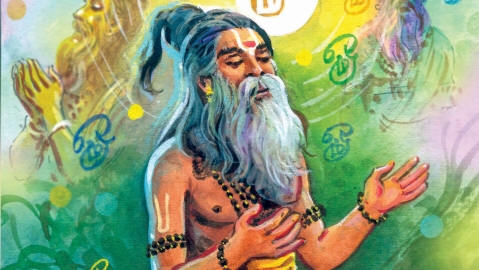Published: on October 21, 2019 at 8 PM; Updated: on October 21, 2019 at 8 PM Sakthi Vikatan
Ādhi & Andham 15 The Great Sayings of Vedas
சேஷாத்ரிநாத சாஸ்திரிகள் & MARUTHI
Śēṣādrinātha Śāstrigaḷ and Māruthi
நிலம், நீர், காற்று, நெருப்பு, ஆகாயம் எல்லாமே பொதுச் சொத்து.
Land, Water, Air, Fire and Ether are common property.

1. We read the sacred story of the descent
of the Celestial Ganges River to the earth because of the efforts of
Bhakīrathaṉ to help his ancestors get a heavenly afterlife.
2. The water circulates in a cycle: Rain,
river, ocean, vaporization by the heat of the sun, clouds in the sky,
and rainfall. Mahaṛṣis taught us this climatological truth about the
water. Kapila Ṛṣi’s story in the Purāṇa depicts this truth.
3. This story reveals another truth. Water as
the element is essential for Taṛppaṇam (libations with the waters of
Ganges). Water for drinking is also the giver of life.
4. Water should never stagnate but flow
continually and freely. It should not be stored in a reservoir; that
stagnant water goes bad. Today, water is a commodity. We have committed
in multiple ways transgressions as this.
5. Land, water, air, fire, and ether are
community property. But what do we do? Avarice to own and exploit these
natural resources for our selfish benefit is the dominant model. We
celebrate ownership of not only the land, but also the ether, and the
oceans.
6. Man’s activities are contrary to Ṛṣi’s
values and thoughts. Ṛṣi Āṅgīrasar says, ‘All are not your possessions.
Do you know what you should own? A small plot for your living space. If
you build a 100-room bungalow, it is one you do not need. You need only
one room for retiring. The rest is not yours. You expropriated what
others should have and deprived them of what they deserve. You committed
an infraction.
7. You must eat to live. Two sacks of rice
should be enough for you to last for a year. But you have stacks and
stacks of rice sacks piled high in your godown. You need the nourishing
milk. One cow should be enough. You own hundreds of cows. You prevent
others from having milk. All these are wrong, said the Ṛṣi. (Comment:
All for one and one for all. In the modern age, rice and dairy farms
serve the community under the state laws that enforce hygiene, fair
price, and even distribution. In the olden days before these laws,
people drank unpasteurized milk from individual cows and died of
brucellosis. The Dairy Farms serve well the people living in the
skyscrapers and city dwellers. No worry for them about caring for cows
in the sheds in the big city. Respectfully submitted.)
8. Bhāradvājar says, , “If you own one measure
more than your need, you are a thief. You must receive punishment.
9. That was the thinking of the Ṛṣis those
days. All consumable products must reach all life forms and should not
be in the ownership of one man. Therefore, when you eat, you feed not
only your family but also the indigents that come to your house seeking
food, the birds, the dogs, and other living forms, as said by the Ṛṣis.
(Such a noble idea.) The Ṛṣis told if a person feeds living beings from
Brahma to a blade of grass (Tulsi) and later eat his food, he would
become a Ṛṣi. This thought did not take hold in the modern man. It will
never happen. The reason is man’s selfishness. Once men have higher
thinking and purpose, they will not have enemies.
10. Gautama Ṛṣi says, “The trees proffer their
fruits to a multitude of life forms and not for their self-consumption.
Likewise, the river is of use for other life forms. Men must also help
others for the weal and the welfare of others. That is the utility of
the body of a man.
11. Take the river. A multitude of life forms
lives in the water. For that, there should be a continuous flow of
water. Narmada River is two km wide and four or five people deep.
Besides other life forms, crocs live in it and eat the riverine food.
12. Once a dam spans across the river, there
was a perceptible loss of life forms. The selfishness of man without
regard for other life forms causes the loss of many faunas. I am not
protesting dams for an insubstantial reason. The truth is this: This
horrendous situation should not take place. The Ṛṣis call the river
Jīvanadhi (Life-giving river). They stress it should not be dammed or
impeded.
13. Likewise, we should protect the mountains
and forests. We destroy the forests, partition the land into plots, sell
them, and build flats (condos) on them. We demolish a mountain into a
flat terrain and celebrate its destruction. It is not only wrong but
also a sin. The wellbeing of the hills and the forests guarantee
rainfall and help the luxurious growth of flora. All life forms prosper
because of it.
will continue.